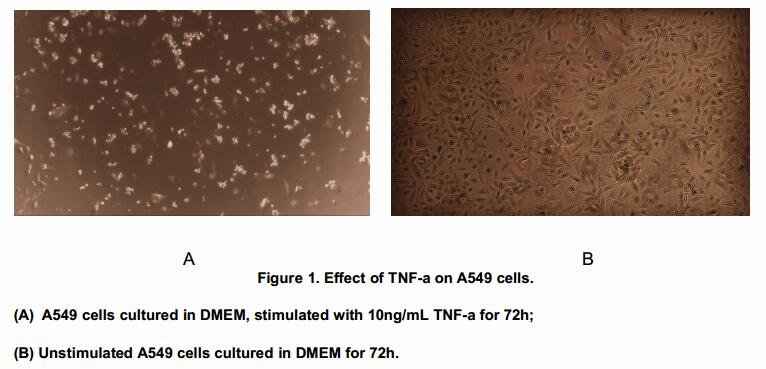Active Tumor Necrosis Factor Alpha (TNFa)
DIF; TNF-A; TNFSF2; Cachectin; Tumor Necrosis Factor Ligand Superfamily Member 2
- Product No.UAPA133Mu61
- Organism SpeciesMus musculus (Mouse) Same name, Different species.
- Buffer Formulation20mM Tris, 150mM NaCl, pH8.0, containing 1mM EDTA, 1mM DTT, 0.01% SKL, 5% Trehalose and Proclin300.
- TraitsFreeze-dried powder
- Purity> 95%
- Isoelectric Point5.0
- ApplicationsCell culture; Activity Assays.
- Download Instruction Manual
- UOM 10µg50µg 200µg 1mg 5mg
-
FOB
US$ 140
For more details, please contact local distributors!US$ 350
For more details, please contact local distributors! US$ 700
For more details, please contact local distributors! US$ 2100
For more details, please contact local distributors! US$ 5250
For more details, please contact local distributors!
ACTIVITY TEST of the Active Tumor Necrosis Factor Alpha (TNFa)

TNF-a, being an endogenous pyrogen, is able to induce fever, necrosis, inflammation and to inhibit tumorigenesis. As reported, TNF-a could inhibit the proliferation and induce necrosis of A549 cells, and the concentration of IL-1β in cell supernatant will increase after stimulation. Therefore, A549 cells were incubated in DMEM with TNFa (1ng/mL, 10ng/mL) for 2h, 4h, 8h, 24h, 48h, then cells were observed by inverted microscope and IL-1β was detected in the cell supernatant by ELISA .<br/>Cell necrosis after incubation with TNF-a (10ng/mL) for 72h was shown in Figure 1.

The production of IL-1β after incubation with TNF-a (10ng/mL) for 8h is shown in Table 1.
USAGE of the Active Tumor Necrosis Factor Alpha (TNFa)
Reconstitute in 20mM Tris, 150mM NaCl (pH8.0) to a concentration of 0.1-1.0 mg/mL. Do not vortex.
STORAGE of the Active Tumor Necrosis Factor Alpha (TNFa)
Avoid repeated freeze/thaw cycles. Store at 2-8°C for one month. Aliquot and store at -80°C for 12 months.
STABILITY of the Active Tumor Necrosis Factor Alpha (TNFa)
The thermal stability is described by the loss rate. The loss rate was determined by accelerated thermal degradation test, that is, incubate the protein at 37°C for 48h, and no obvious degradation and precipitation were observed. The loss rate is less than 5% within the expiration date under appropriate storage condition.
INCREMENT SERVICES
BCA Protein Quantification Kit
Molecular Mass Marker for Protein
Monoclonal Antibody Customized Service
Polyclonal Antibody Customized Service
Protein Activity Test Experiment Service
Electrophoretic Mobility Shift Assay (EMSA) Experiment Service
Buffer
Lentivirus Packaging Experiment Service
Adenovirus Packaging Experiment Service
Real Time PCR Experimental Service
Spike RBD Protein (S-RBD)
Protein G
Protein A



